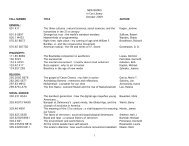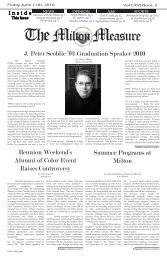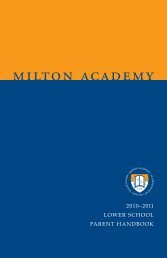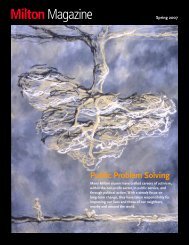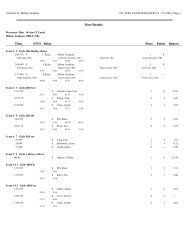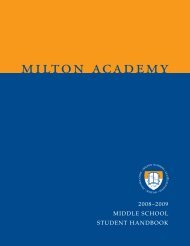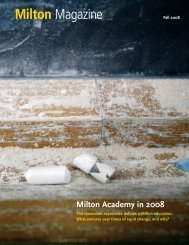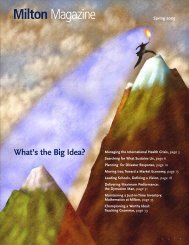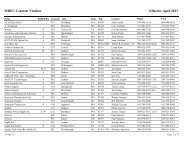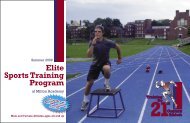You also want an ePaper? Increase the reach of your titles
YUMPU automatically turns print PDFs into web optimized ePapers that Google loves.
“I don’t go through a lot of mental preparation[even for difficult stories]. On somelevel, a lot of people want to talk to us. It’sa catharsis [if they’re in a crisis]. There areways to be kind and understanding whenyou approach someone with hard questions.The bottom line is that if peoplewant to tell their stories, I can help them.”Ned realized the power of storytelling atan early age: “When I was a kid, I watcheda lot of local news. I did speech team andknew that I wanted to apply those skillsdirectly—that I wanted to follow this path.“I think that [TV news] often gets a badrap for not being serious enough. A ton ofreally conscientious people are in thisbusiness for the right reasons.“People in the audience really develop aconnection with the people who bringnews into their homes. In the end, whatwins out is good storytelling. What I loveabout my job is that I learn somethingnew every day and can share it with thecommunity.“I become a mini-expert.”Ned Roberts joined Tampa Bay’s 10 Newsas a general assignment reporter in May2000. Before moving to the Bay Area, heworked as a reporter in Jacksonville,Florida, at WJXX-TV.Prior to his time in Florida, Ned reportedfor the CBS affiliate in Lexington,Kentucky, during a fellowship. His workthere earned him national recognition forexcellence in broadcast journalism. Hewon a first-place award for Spot Newsfrom the Society of ProfessionalJournalists, as well as a first-place awardfrom the Hearst Foundation.Ned graduated from the Medill School ofJournalism at Northwestern University inJune 1998.Name: Caroline Cornish Kmack ’94Station: Reporter, WSCH,Portland, MaineA <strong>Milton</strong> assignment brought Caroline tothe decision to become a journalist.“In Mr. Fricke’s non-fiction English class,we had to write an article about anythingwe wanted. I loved the Red Sox and watchingthe news, so my father suggested Iwrite my article about television sportsreporters. I called channels 4, 5 and 7.Bob Lobel invited me to the station for aninterview. I talked to him for 20 minutes,and then he let me watch the 6 o’clocknews from the studio. Afterward, he toldme I asked some very good questions andhe gave me his scripts.“At the time, it didn’t occur to me thatanchors toss their scripts out after everybroadcast, so I thought he was the greatestguy I had ever met. I still have the scripts.I think I got a B on the paper, but I realizedthen that not only was I capable ofbecoming a reporter, I was going tobecome one.” As her advisor and speechcoach, Dale Deletis helped her gain confidenceto speak in front of crowds and inalmost any other situation, she adds.“<strong>Milton</strong> gave me the tools to think criticallyabout the world and encouraged me tothink about issues that may not affect medirectly,” Caroline says.Now Caroline helps other think: “In thebroadest sense, my job is to keep peopleinformed about what’s going on in theworld. But my goal also is to get peopleto care about what’s going on in theircommunities.“My first priority is to get the facts right.Your writing or your pictures don’t matterif the story is wrong. You have to do everythingyou can to represent the truth. Tothat end, I feel my job is always to be fair.Sometimes you interview people you don’tlike, but that can’t affect your reporting.My job is to present all sides fairly.“My best moments come when I try to doa little extra to help the story. A coupletimes, my photographer and I have goneout of our way to get one more picture orone more interview that ends up leadingus to a treasure that makes the story 100times better,” she says. “For instance, oneday we heard that police were going tosearch the home of the estranged husbandof a murder victim, Chellie Calloway. Wehad no idea where the house was in thetown. But as we searched, we ended upfinding the victim’s brother, who gave usinsight into who Chellie was. That interviewallowed our viewers to see her as aperson, not a statistic.”Caroline loves her work, but the public’sperception that TV news reporters caremore about the story than about people isCaroline Cornish Kmack ’94frustrating, she says. “I think the most difficultpart of my job is going out to a storythat’s sad or upsetting, like a murder or adrowning, and having people act asthough I am purposefully antagonizingthem. I ask questions because those peoplecan help you understand the victim,and sometimes people want to talk. It’smy job to let people know what’s goingon, whether it’s good news or bad.”As a reporter for five years, Caroline saysshe is witnessing a shift in the way newsis collected and broadcast. “I hear peopletalk about how the 24-hour news cycleputs more pressure on journalists to gettheir work done quickly, and that pressurecan lead to mistakes. That’s true, but thebiggest challenge reporters face is separatingfacts from rumors. Many blogs outthere give information that may or maynot be accurate. No one wants to bebehind the pack, but now we need to bemore careful than ever that our informationis correct before we go with it.”Caroline Cornish Kmack (who does notuse “Kmack” professionally) joined theNews Center team in January 2004. Shebegan her reporting career at WNNE inWhite River Junction, Vermont, and thenmoved to WPTZ in Plattsburgh, NewYork. She earned a bachelor’s degree incommunication studies and a master’s injournalism from Northwestern University.Heather Sullivan16 <strong>Milton</strong> Magazine



